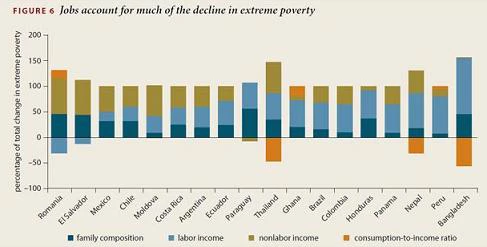From the World Development Report 2013.
Quantitative analysis confirms that changes in labor earnings are the largest contributor to poverty reduction. In 10 of 18 countries, changes in labor income explain more than half the reduction in poverty, and in another 5 countries, more than a third. In Bangladesh, Peru, and Thailand, changes in education, work experience, and region of residence mattered, but the returns to these characteristics (including labor earnings) mattered most. Just having work was not enough, given that most people work in less developed economies. What made a difference for escaping poverty was increasing the earnings from work.
Sources: Azevedo and others 2012; Inchauste and others 2012; both for the World Development Report 2013.
Note: Family composition indicates the change in the share of adults (ages 18 and older) within the household. Labor income refers to the change in employment and earnings foreach adult. Nonlabor income refers to changes in other sources of income such as transfers, pensions, and imputed housing rents. If a bar is located below the horizontal axis, it means that that source would have increased, instead of decreased, poverty. The changes are computed for Argentina (2000–10); Bangladesh (2000–10); Brazil (2001–09); Chile (2000–09); Colombia (2002–10); Costa Rica (2000–08); Ecuador (2003–10); El Salvador (2000-09); Ghana (1998–2005); Honduras (1999–2009); Mexico (2000–10); Moldova (2001–10); Panama (2001–09); Paraguay (1999–2010); Peru (2002–10); Nepal (1996–2003); Romania (2001–09); and Thailand (2000–09). The changes for Bangladesh, Ghana, Moldova, Nepal, Peru, Romania, and Thailand are computed using consumption-based measures of poverty, while the changes for the other countries are based on income measures.


Join the Conversation